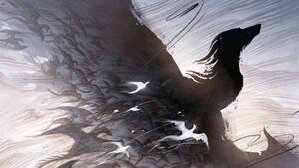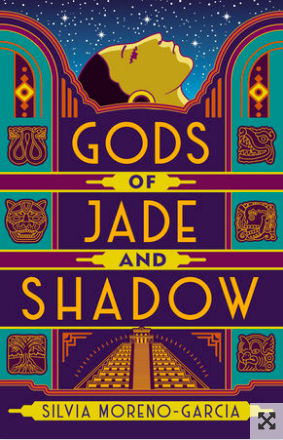We marvel at technology, the magic of a made thing. The uncanny robot, the wind-up toy, the clever automaton—all are sources of endless fascination. We indulge the tricks of a puppet sideshow with a knowing smile, but a vague feeling of horror lingers beneath our certainty that it’s nothing more than sleight of hand. Adrian Tchaikovsky has taken this mix of emotions and given them a fine edge in Made Things, a rollicking novella with some dark twists that will keep you turning the pages late into the night.
The characters are an endearing band of rakish rouges. Coppelia is the plucky heroine, an orphan and a thief, determined to carve out a place for herself in the rougher parts of the city of Loretz. Coppelia was born, but her companions were made: she has teamed up with two six-inch-tall homunculi whose forebears were brought to life by a rogue mage. In order to prosper and grow, the homunculi need someone to craft new bodies for their next generation, and and they need magic for the secret ritual that brings new homunculi to life. As the child of a master craftsman, Coppelia can make the bodies. Getting the magic is another matter, however. That’s where the thievery comes in.
Tchaikovsky has a well earned reputation as an author who excels at creating deeply imagined worlds. The setting in Made Things is richly layered, filled with distinct cultures, environments, and a history of conflict. His use of magic in this world is especially intriguing. In Fountains Parish, Loretz is the city of the magi, and every inhabitant is at least half-mage. Magic here is an inexact science. It is part gift, part technique, and the foundation of commerce. Loretz is highly stratified in the style of Dickens’s London: Archmages vie with Mage-Lords for ultimate power, while beneath them a privileged class of magi are served by middle-class merchants. There is a workhouse for the impoverished, and a disreputable slum for the rascals like our heroine. But the difference between half and full mage isn’t what you’re born with, as Copellia’s mentor tells her:
“It’s not skill that makes them mage-lords. It’s a fat inheritance is all … not talent, not personal power, but they have the stuff, dear heart. Staves, crowns and gems, enchanted spoons and the querns that turn corn into bees and all that other nonsense. The good stuff, that we never see.”
Magic begets more magic. Those who have, hoard their objects to increase their power. Those in power preserve it through those objects, which they use to imbue more objects with charms. The analogy is not subtle, but it is apt and resonates with reality.
In another section, Copellia muses on the loss of her parents, who were likely forced into labor for some powerful mage because of their exquisite skills and artistry. She notices that if someone from her neighborhood disappears, the upper echelons of the city close ranks and say the missing deserved their fate. The powerful “went on telling the same old stories of justice and just dessert, because to do otherwise might be uncomfortable.”
Beneath the fun (and there is so much fun in this story) there is an implied conflict that draws a straight line from the distant past to the present. Long ago, one mage left the toxic conventions of privileged Lorentz and gave himself entirely to the task of imbuing his creations with the spark of life. Meanwhile, another mage also sought the secret of life, but wished to use that knowledge to preserve his own at any cost. The cost of immortality is high, however. Almost every character seeks to make puppets of others in this world, desiring to control life for their own ends. Magic is just a means to power. But despite her shrewdness, Copellia carries wonder in her heart, she makes friends, and that’s what wins out in the end.
Read Similar Stories
In this final novel of The Daevabad Trilogy, Ali, Nahri, and Dara are morally challenged beyond endurance by the rise of death magic in their beloved kingdom. How they respond changes everything.
Craig Laurance Gidney’s Marsh-bell Queen is half muse, half greedy ghost, and all fascinating.
Butterfly Lampshade is Aimee Bender’s first novel in a decade and the follow-up book to her incredible short story collection The Color Master (2013). A book about memory and isolation that we didn’t know we needed.
Karen Osborne’s debut is part sci-fi adventure, part love story, and 100% critical of unfettered corporate capitalism.
Every Bone a Prayer, the impressive debut novel by Ashley Blooms, is an expressionistic To Kill a Mockingbird of personal trauma.
The new novel from the author of Station Eleven is eerily relevant, and it’s not even about a pandemic this time.
A diverse collection of sci fi and fantasy stories and poems about Western and Eastern dragons and their relationships with families and humans, blood and gold.
Looking for your next read? Check out Malcom Devlin’s Engines Beneath Us available now from TTA Press.
Volume five of The Murderbot Diaries, reviewed.
You won’t want to miss this haunting debut collection. Thin Places by Kay Chronister available now from Undertow Publications.
Guest contributor M. Shaw reviews Roupenian’s studies in feminist horror.
Reading something dark and fantastic is great for enduring a pandemic.
What does it mean to have agency when we find ourselves at the mercy of events utterly beyond our control?
Flocks of red birds haunt a school where girls are shaped by the desires of others. Clare Beams examines the creeping horror of growing up female.
In Leigh Bardugo’s Ninth House the unlikely place of New Haven, Connecticut is one of the world’s centers of magical power.
A welcome entry into the non-Western fantasy field set in the ancient Mayan underworld, Xibalba, and the Mexican Jazz Age.
The Fiction Unbound editors discuss connections and similarities between The Good Place and Good Omens. Meta observations about storytelling and what makes us human ensue.
If you love Alice’s Adventures in Wonderland you won’t want to miss this anthology, a collection of seventeen original works that will make you reexamine your own relationship to Wonderland.
In Hugo Award-winner Alix E. Harrow’s debut novel, ordinary doors open to ordinary spaces and capital D Doors open to other worlds.
Carmen Maria Machado’s genre-bending memoir is a formally dazzling and emotionally acute testimony of an abusive queer relationship.
The world of Fountains Parish is a delightfully dark steampunk fantasy, where making friends takes on every shade of meaning. Homunculi, golem, AI, human—the difference between the spark of life that comes by way of magic and the one that comes from nature might not be as big as you think.
Nino Cipri’s short story collection, Homesick, explores the impact of the things that haunt us and how, most often, that thing is the true self we most wish to deny.
The difficult details about real traumas China suffered in the early 20th century make this widely-praised trilogy uniquely interesting. The unusual fantasy elements and atypical heroine’s journey are bonuses.
You won’t want to miss the latest from Priya Sharma. Ormeshadow is a quick read that packs an emotional punch.
Finalist for 2019 Hugo Award for Best Novel, Catherynne M. Valente’s Space Opera is well worth checking out. Fiction Unbound dives into this science fiction story about an intergalactic Eurovision contest that will determine the fate of humanity.
Sarah Pinsker’s debut novel sings the joys of connection and the discontent of sticking it to the Man.
Don’t miss this latest release from Undertow Publications: All The Things We Never See by Michael Kelly. It will have you itching to create, which will be a good use of the time you used to spend sleeping.
































Cadwell Turnbull's new novel — the first in a trilogy — imagines the hard, uncertain work of a fantastical justice.